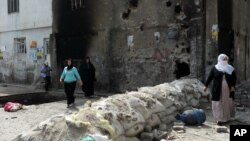The escalating conflict between the Turkish state and the PKK Kurdish rebel group has resulted in increased curfews and temporary security zones across Turkey's predominantly Kurdish southeast. But more and more questions are being raised over the zones' legality and their impact on a free election due in November.
Since July’s collapse of a cease-fire with the PKK, Turkish security forces have enforced more than 100 temporary and military security zones across southeastern Turkey. The zones, which can be imposed for up to six months, largely affect rural regions in the center of much of the fighting with the Kurdish rebels.
Senior Turkey researcher Emma Sinclair-Webb of U.S.-based Human Rights Watch says many people make their livelihood in the affected regions and that she is concerned about the stringent powers imposed in the zones.
"If you do not leave the zones, you are liable for prosecution; there is no security of life there. The press cannot be there; you cannot have freedom of expression in those areas; you cannot have freedom of movement and there is a big risk of the arbitrary use of power in those areas against citizens and that could be very abusive," she says.
Security zones
Sinclair-Webb says local governors in consultation with the military are imposing the security zones with no published criteria of use and no parliamentary supervision.
The use of security zones is coupled with increasing numbers of curfews being imposed in towns and cities across the predominantly Kurdish region.
Turkey is set to hold a general election November 1 and political columnist Semih Idiz of Turkey’s Cumhurriyet newspaper and al-Monitor website says doubts about the fairness of the poll are increasing.
"The more these security measures and state of emergencies are imposed on large swaths of Turkey where there are large elements of the electorate, the more the legitimacy of the elections will be questioned by domestic and international observers," Idiz says.
The AK Party lost its majority in the June election largely due to the pro-Kurdish HDP entering parliament for the first time. How Kurds vote in November is seen by observers as key to the election's outcome.




